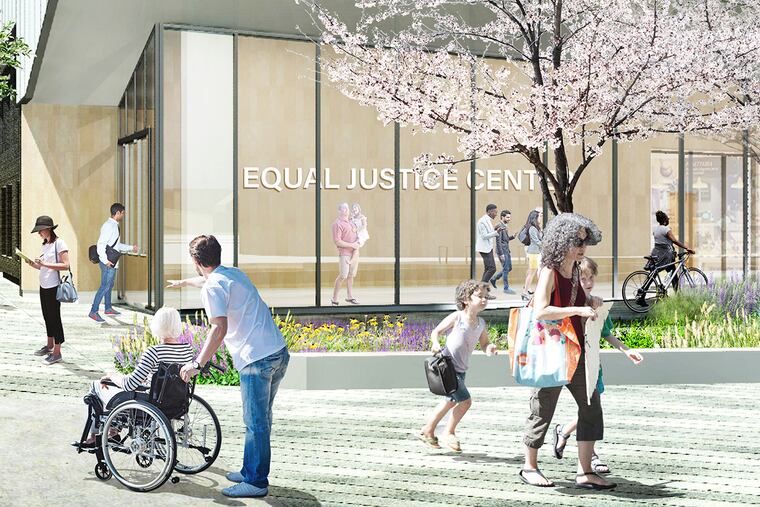Now more than ever Philly needs a one-stop shop for legal services | Opinion
The Equal Justice Center (EJC), to be built in Philadelphia’s Chinatown neighborhood, will house a collection of organizations that will provide effective and efficient legal services, in one location, for all Philadelphia residents.

As Philadelphia grapples with the highest poverty rate among the nation’s 10 largest cities — 26 percent of the population lives below the poverty line, with 14 percent living in “deep” poverty — many citizens struggle to find legal assistance. Disaffected Philadelphians are growing in number, and resources for those in need are insufficient to meet demand.
Legal services work for the disaffected only when people have access to them. Only about 20 percent of low-income Philadelphians have access to lawyers to help them navigate high-stakes situations that jeopardize their families, jobs, homes, and lives.
And legal service agencies work best when they have strong financial support from their communities and operate with maximum efficiency. Many nonprofits, specializing in certain areas of the law, are challenged to serve these clients, as interlocking problems can involve health, education, child welfare, housing, homelessness, and civil rights. These specialized legal services are currently spread out across the region and not easily accessible to the clients that need them most. Further, recent tax changes have disincentivized taxpayers from making charitable contributions for these and other organizations helping those in need.
The time is now for Philadelphia to have a one-stop shop for legal services.
The Equal Justice Center (EJC), to be built in Philadelphia’s Chinatown neighborhood, will house a collection of organizations that will provide effective and efficient legal services, in one location, for all Philadelphia residents. The EJC will co-locate some of the largest regional nonprofits that provide free or low-cost legal and social services to our most underserved populations.
With construction starting later this year and completion expected in 2022, the EJC will be the first of its kind in the United States.
It will feature:
Space for 13 different legal services organizations in one location.
An intake center allowing clients to be referred immediately to the appropriate agency.
Up to 20 percent in cost reductions for tenants through shared conference and meeting spaces, internet, phone, and other administrative services.
Innovative facilities employing the latest technology available to the legal industry to allow more clients to be served.
The Equal Justice Center is spearheaded by the Philadelphia Bar Foundation. Tenants include Community Legal Services, the Public Interest Law Center, Philadelphia Legal Assistance, Regional Housing Legal Services, and the Women’s Law Project.
As part of the leadership group for this project, we believe it is now vitally important to stress the need for this project and the statement it will make here and across the country.
Currently, the city's nonprofit legal service organizations all operate in different sites across the area (including in Chinatown), providing free services to those most in need in Philadelphia. These agencies pay market rents and have continually rising expenses in the face of decreasing federal and state dollars and smaller donation numbers. The gathering of all of these organizations in one location, with shared spaces and services, and with controllable residency costs, is not only a laudable goal – it is now an imperative.
Those with limited means currently travel to different agencies in different parts of the area, using time, money, and other resources that are already in short supply. This includes people who are looking to gain a foothold in our country, those looking for affordable housing, children in the city’s foster-care system who need someone to give them hope, and people who need legal help just to maintain housing, benefits, a good-paying job, and food for their families.
Delivery of these services could be dramatically improved and increased with collective effort and an integrated facility. No other city has supported its nonprofit legal service entities this way – Philadelphia should lead the way.
From a dollars-and-cents point of view, funding legal aid is a no-brainer. Research consistently shows that every dollar invested in legal aid yields, on average, an $11 benefit for each individual, family, and the community. The EJC is conservatively projected to serve over 30,000 clients annually and have an annual social and economic impact on our area of at least $100 million.
The time is now for Philadelphia, for Pennsylvania, and for all of us to support these nonprofit agencies who serve those most in need. The time is now for the Equal Justice Center.
David L. Cohen is senior executive vice president and chief diversity officer of Comcast Corp.; Robert C. Heim is a partner, Dechert LLP; Leslie Anne Miller is principal, Leslie Anne Miller, Esq., LLC.